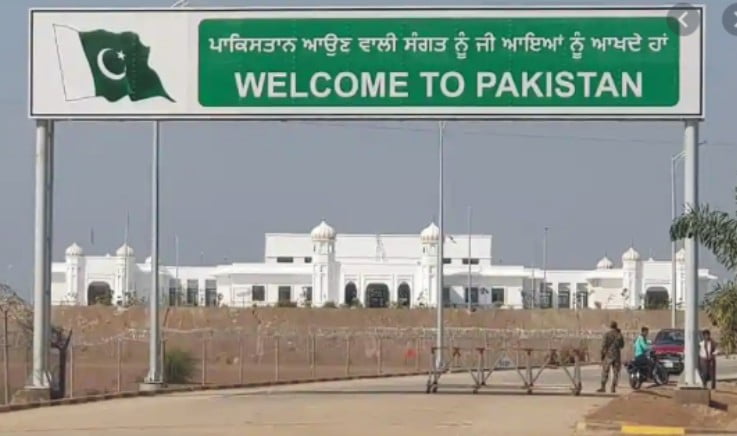

It is an irony of the highest order that access to the Kartarpur Sahib – a legacy and gift of Guru Nanak, a dire peace initiative among two poorest and beleaguered nations in South Asia – has forever been seen through a prism of suspicion and doubt.
It is also evocative of the immense divergence, even contradiction, between the tradition and aspiration of the people of Punjab (both sides of the Radcliffe line), the followers of Guru Nanak (far beyond the Sikh community alone) and the machismo of the modern Indian state mostly confined to TV studios with great reach in the Indian population.
When the Imran Khan government in Pakistan took oath in August 2018 and proposed the opening of a corridor to Kartarpur Sahib to Indian politician and fellow former cricketer Navjot Singh Sidhu, the Indian media launched a no holds barred campaign based on fear mongering and Khalistan activities against Sidhu.
Yet, all those doubts could not stop the initiative and in November 2019, on Guru Nanak’s 550th birth anniversary, the corridor indeed opened. Indian politicians and media made a lot of noise against it but finally the Indian government participated with the Pakistan government to herald a new era in confidence building with each other.
The Sikh community and other believers in Guru Nanak were joyous because their long pending prayer – since Partition – was fulfilled to an extent.
Yet, the way the travel arrangements were laid out, there was a vital barrier. For some inexplicable reason, the passport was a mandatory requirement.
The number of visitors never increased beyond a couple of thousand in any month because less than six percent of Indian citizens have a passport.
The need was to revoke this barrier, indeed make it a free access with due security checks. The Indian government however kept making noises about security concerns.
In February 2020, the current Punjab Police Chief irresponsibly commented: ‘Kartarpur(Sahib) offers a potential that you send somebody in the morning as an ordinary chap and by evening he comes back as trained terrorist actually. You are there for six hours, you can be taken to a firing range, you can be taught to make an IED.’
Though he later regretted his comment, the damage was done.
Then came the Coronavirus and by end of March 2020, while many religious places around the world including the Vatican and Mecca Medina were being shut, the Pakistan government closed Kartarpur Sahib.
Though there has been no let-up in the Covid-19 contagion, the numbers of cases and casualties in both nations are rising, in order to revive the economy, the Indian government has announced unlockdown.
Recently, Pakistan announced that on Maharaja Ranjit Singh’s death anniversary they are willing to open the Kartarpur Sahib corridor from early July.
At the same time there have been other developments: new incidents of the familiar spy-rings between India and Pakistan, trouble from China in the Galwan Valley in Ladakh, 20 soldiers dead in a hand-to-hand combat with the Chinese to whom strangely the Indian Prime Minister has given a clean chit.
Contrast this with the Pulwama blast in February 2019 followed by the unclear Balakot air-strike that Pakistan refutes but which helped the BJP win the general election 2019.
Even ever friendly Nepal claiming Indian border posts in its maps and Bhutan denying canal waters to farmers in Assam.
For a change, neither the Sikh community nor the other followers of Guru Nanak responded to Pakistan’s gesture.
On the face of it, India has refused the offer. There has been no explanation whether it was for security or public health reasons.
As far as security goes, India has been cagey but until now it has participated in the peace initiative of the opening of Kartarpur Sahib corridor. India must continue walking the path.
In fact, India must now work towards removing the passport as a criteria so that more pilgrims can visit.
Then India must push Pakistan to come true on other promises such as opening access to Sharda Peeth – a long pending aspiration from the Kashmiri Pandit community – and other gurdwaras and temples and demonstrate its sincerity.
As far as health goes, the transmission of the Coronavirus needs to be checked across borders for both sides. There are enough protocols in place and precautions must be practised.
Recently the annual Rath Yatra in Puri was allowed.Only Covid-19 tested priests and servitors were allowed to participate.
It is not a difficult call provided India intends to build peace in South Asia. Yet, if both governments aver, the call can wait until both nations manage to flatten the Coronavirus curve.
What was revealing in India’s blunt, no explanations response was that it was in keeping with an image of machismo that India seeks to build in the region.
This machismo has been recently punctured by China, Nepal and even Bhutan. India cannot afford such loss of image. That is why India needs a rethink of its foreign policy with its neighbours.
The Covid-19 contagion has already devastated the economy. India’s need is to build the nation, maintain peace on borders, and not spurn friendly gestures by its neighbours.

Disclaimer : PunjabTodayTV.com and other platforms of the Punjab Today group strive to include views and opinions from across the entire spectrum, but by no means do we agree with everything we publish. Our efforts and editorial choices consistently underscore our authors’ right to the freedom of speech. However, it should be clear to all readers that individual authors are responsible for the information, ideas or opinions in their articles, and very often, these do not reflect the views of PunjabTodayTV.com or other platforms of the group. Punjab Today does not assume any responsibility or liability for the views of authors whose work appears here.
Punjab Today believes in serious, engaging, narrative journalism at a time when mainstream media houses seem to have given up on long-form writing and news television has blurred or altogether erased the lines between news and slapstick entertainment. We at Punjab Today believe that readers such as yourself appreciate cerebral journalism, and would like you to hold us against the best international industry standards. Brickbats are welcome even more than bouquets, though an occasional pat on the back is always encouraging. Good journalism can be a lifeline in these uncertain times worldwide. You can support us in myriad ways. To begin with, by spreading word about us and forwarding this reportage. Stay engaged.
— Team PT


Copyright © Punjab Today TV : All right Reserve 2016 - 2024 |